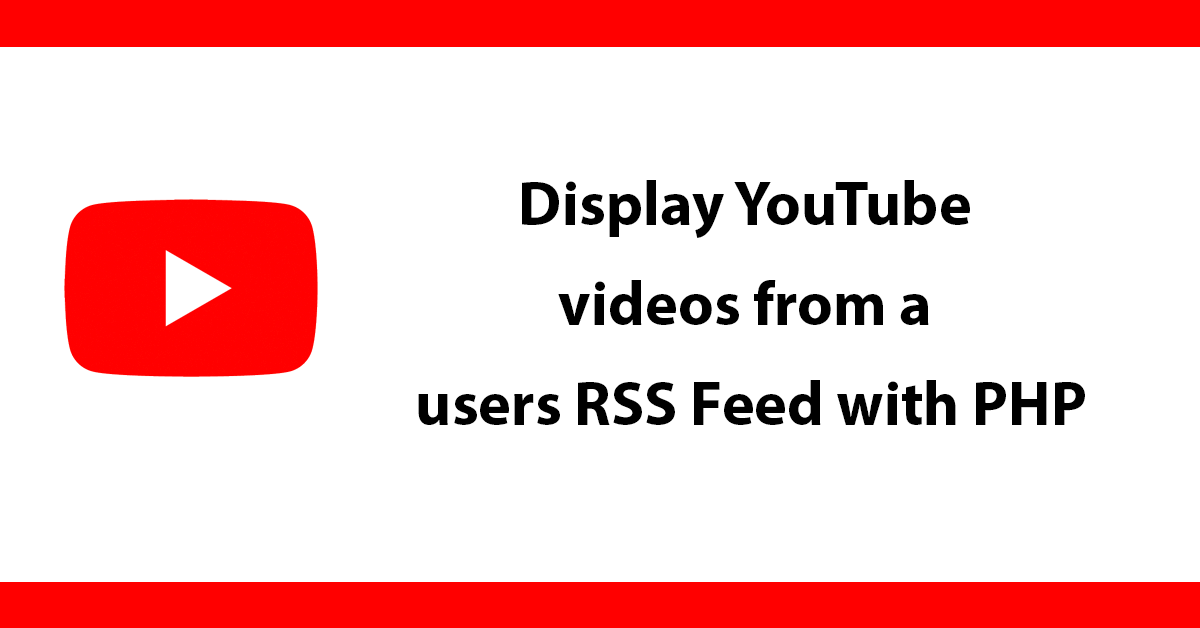Table of Contents
Using an RSS feed you can load videos from a users feed, this can be as simple as a list of videos to embed them.
Demo: https://demos.dcblog.dev/youtube
The demo loads the 10 latest videos from my YouTube channel.
To get started first create a function to use curl which will load the rss feed to pass to it.
function curl_get_contents($url) {
// Initiate the curl session
$ch = curl_init();
// Set the URL
curl_setopt($ch, CURLOPT_URL, $url);
// Removes the headers from the output
curl_setopt($ch, CURLOPT_HEADER, 0);
// Return the output instead of displaying it directly
curl_setopt($ch, CURLOPT_RETURNTRANSFER, 1);
//set timeout
curl_setopt($ch, CURLOPT_CONNECTTIMEOUT, 1);
// Execute the curl session
$output = curl_exec($ch);
// Close the curl session
curl_close($ch);
// Return the output as a variable
return $output;
}
Now call the function and passing the address to an RSS feed, change the channel_id to the id of the channel you want to use. To find the id of a channel:
Go to the YouTube channel you want to track
View the page’s source code
Look for the following text: channel-external-id
Get the value for that element (it’ll look something like UCBcRF18a7Qf58cCRy5xuWwQ
Credit for the above steps from https://danielmiessler.com/blog/rss-feed-youtube-channel
If you don't have curl installed you can use file_get_contents instead.
After adding the feed path to a variable convert it to xml by using SimpleXmlElement
$feed = curl_get_contents("https://www.youtube.com/feeds/videos.xml?channel_id=UC7QziMG7v407vgQLUzyFG_A");
$xml = new SimpleXmlElement($feed);
At this point you might want to see what the $xml variable contains using print_r is a good way of displaying its contents:
print_r($xml);
Now the $xml is an object pulling information out is a simple process for instance to display the title of the video you need to go down to that part of the object this is done using -> notations each one moves to the next section $xml->entry moves into the entry section from there you can grab the title:
echo $xml->entry->title;
<p>This only gets the very first item to get more than one you'll need to loop through all the entries, you can use a foreach here but you have better control using a for loop then you can either loop for all of the entries or limit them to say the first 10, this approach makes more sense they may be a lot of entries to it makes sense to limit them.</p>
<p>If you did want to load all entries you can count them by using:</p>
```php
$count = count($xml->entry);
In this instance, I'm only loading 10 entries to reduce loading times, inside a for loop which says while $i is less than 10 increments $i so once it reaches 20 it will stop incrementing $i and stop.
for ($i=0; $i < 10; $i++) {
Inside the loop the first thing I'm doing is looking at the url of the video and I only want the video id part for
example look at the following url http://www.youtube.com/watch?v=EeX7MOWKi0s&feature=youtube_gdata notice EeX7MOWKi0s that's the part I want to use, it's worth noting this step is only needed if you want to embed the video.
First I collect the url as its an array I've appended () to the end next I'm exploding where the url have an & only looking at the href array element. Then removing the address as that part does not change.
$url = $xml->entry[$i]->link->attributes();
$videourl = explode("&",$url['href']);
$video = str_replace("https://www.youtube.com/watch?v=","",$videourl[0]);
To embed the video its jut a case of using an iframe and passing in the video id:
echo '<p><iframe width="560" height="315" src="https://www.youtube.com/embed/'.$video.'" frameborder="0" allowfullscreen></iframe></p>';
As we are in a loop to display the correct item we need to tell the array, in this case, the entry which part we want to use I do this by passing in $i after the entry so to get all the titles in a loop:
echo $xml->entry[$i]->title;
<p>All of the items are called the same way so I won't go over all of them, I've only chosen a few in my example you could have the author the category etc.</p>
<p>Another one worth noting is the published date I don't like how it looks in the feed to I've customised it by using date and strtotime.</p>
```php
date('jS M Y h:i:s', strtotime($xml->entry[$i]->published))
This has a much nice look to it, plus you can easily change how the date and time will be displayed.
Putting it all together:
<?php
function curl_get_contents($url) {
// Initiate the curl session
$ch = curl_init();
// Set the URL
curl_setopt($ch, CURLOPT_URL, $url);
// Removes the headers from the output
curl_setopt($ch, CURLOPT_HEADER, 0);
// Return the output instead of displaying it directly
curl_setopt($ch, CURLOPT_RETURNTRANSFER, 1);
//set timeout
curl_setopt($ch, CURLOPT_CONNECTTIMEOUT, 1);
// Execute the curl session
$output = curl_exec($ch);
// Close the curl session
curl_close($ch);
// Return the output as a variable
return $output;
}
$feed = curl_get_contents("https://www.youtube.com/feeds/videos.xml?channel_id=UC7QziMG7v407vgQLUzyFG_A");
$xml = new SimpleXmlElement($feed);
$count = count($xml->entry);
for ($i=0; $i < 10; $i++) {
$url = $xml->entry[$i]->link->attributes();
$videourl = explode("&",$url['href']);
$video = str_replace("https://www.youtube.com/watch?v=","",$videourl[0]);
echo '<h1>'.$xml->entry[$i]->title.'</h1>';
echo '<p>Posted on '.date('jS M Y h:i:s', strtotime($xml->entry[$i]->published)).'</p>';
echo '<p><iframe width="560" height="315" src="https://www.youtube.com/embed/'.$video.'" frameborder="0" allowfullscreen></iframe></p>';
echo '<p>'.$xml->entry[$i]->content.'</p>';
echo '<p><a href="'.$url['href'].'">Play on Youtube</a></p>';
}
?>

